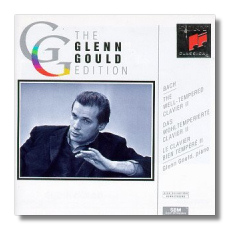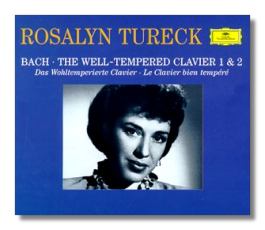
The Internet's Premier Classical Music Source
Related Links
Recommended Links
Site News
Johann Sebastian Bach
Performances of "Well-Tempered Clavier"
Book II, Part 2
Prelude & Fugue in D Major – The prelude is by most accounts one of humor, joy, and ceremony. But I feel there's much more going on in the details of the music which only Gould and Tureck examine. Their readings reveal the mastery of Bach with Gould taking first place mainly by virtue of a soundstage just perfect for revealing details and an aristocratic interpretation. Tureck's sound, at best, doesn't interfere with one's concentration.
The D Major Fugue is generally played as reflective and uplifting music with a contrasting assertiveness toward the conclusion. There is much overlapping of subject entrances (stretti) which really constitutes the technical foundation of the music. Every version is rewarding; Hewitt and Schepkin are particularly reflective, Gould uses his staccato approach to good effect, Schiff's reading is gorgeous, and Gulda is highly assertive from the start. Tureck's is the most rewarding; her reading is thoroughly a meditative one which best highlights the stretti.
Prelude & Fugue in D minor – The Prelude is wild and powerful music. In excellent performances, propulsion and precision are prevalent as well as a strong focus on the nuances of the piece. Six versions have significant lackings – Roberts, Nikolayeva, Aldwell, and Schepkin are too matter-of-fact, missing the nuances as great passages come and go with little notice. Schiff gets stalled, losing the propulsion. Fischer is simply unidiomatic with fierce sound. Gould, Gulda, and Hewitt are excellent; Hewitt is a little short on propulsion but handles the nuances beautifully. Jandó and Tureck are superb. Jandó gets everything right, and Tureck provides a suspenseful and sinister reading.
So far, Nikolayeva is a good example of the overall strength of the competition. Although she is toward the bottom of the competitive field, her performances have been at least enjoyable and often much better. But whenever she delivers a first-rate reading, one or more other versions gets closer to the core of the music.
The D minor Fugue has tension, depth, dynamic shading, and a sense of the macabre throughout, but Roberts doesn't really touch those facets in his performance. It's as if he's saying – "I played it straight and strong. What's next?" The other versions are fine with Tureck, Nikolayeva, and Gould being special. Tureck is slow paced, highly detailed, tense, and emotionally strong. Nikolayeva highlights the macabre elements beautifully. Gould has an unusual and infectious pacing with much drama. Overall, Gould is showing he has much to offer beyond precision, speed, and clarity. He often displays a great sense of drama, poetry, and subtlety. He has the total package in his own unique way.
Prelude & Fugue in E Flat Major – The Prelude is delicate, beautiful, seamless, serene, subtle, and joyful. Having just spoken very well of Gould, I have to relate that his prelude is absurdly fast and possesses none of the qualities mentioned above. Fischer is fast and rather oppressive. Schiff is ordinary. Tureck, Roberts, Nikolayeva, Hewitt, Gulda, and Jandó give fine performances. Tureck is the slowest paced and very clinical; this has its own rewards, but I did miss some warmth and joy. Schepkin and Aldwell are exceptional. Schepkin's reading, of average tempo, is a great mainstream performance having all the elements of the music in perfect unison. Aldwell is relatively slow, infectious, dreamy, and yet highly detailed; his combination of seamless flow and detail is stunning.
The four-part E Flat Major fugue is a life-affirming and moderately assertive piece which only three versions are found lacking in: Hewitt, Schiff, and Nikolayeva. Hewitt is quick and choppy, Schiff is quick and trivializes the music, and Nikolayeva is too heavy-handed. The other versions are good with Fischer outstanding. His reading is slow paced, detailed, and possesses much poetry and tension without any key banging. There is some bad sound to overcome, but the performance warrants it.
Prelude & Fugue in D sharp minor – The Prelude is bitter/sweet music which Bach writes so well. Gould provides a war-like reading which might be appropriate for a "Lethal Weapon" movie but not for this prelude; he starts off by racing through the music and then he blasts his way through the first repeat. This does not meet minimum standards.
Most of the other versions are good with a tendency to lose interest in the second half of the prelude. But, Hewitt and Tureck are excellent throughout. Hewitt's reading is gorgeous while Tureck's is slow paced and incisive. Speaking of Tureck, her set is so far the best of the surveyed versions. I don't think she has yet to deliver a sub-standard performance, and they have often been among the best or simply the absolute best.
Tureck's tempos are relatively slow as she brings to the forefront great detail, poetry, command of counterpoint, and an incisiveness of the highest order. The sound can be troublesome, but great performances relegate that factor to a minimal status. And, unlike Gould, every performance which is far off the "norm" is musically enlightening and represents a favorable interpretive decision.
The Fugue in D sharp minor is generally considered dark and mournful music with a few rays of light interspersed; it's not easy music to appreciate quickly. I've spent two days with this fugue and concluded that, for me, a strong sense of tension without down playing the poetic elements of the music enhances my musical enlightenment. Nikolayeva and Jandó are the best versions; they don't get bogged down in any sentimentality, are highly poetic, and display strong tension throughout.
Aldwell, Schepkin, Schiff, Tureck, and Hewitt are excellent performances. So is Gould whose reading, although the quickest, maintains a high degree of poetry. Fischer, Gulda, and Roberts, have problems. Fischer's sound in soft passages tends to fade away, and louder passages are shrill; Fischer's performance just isn't good enough to overcome the poor sound. Gulda is somewhat mechanical and detached. Roberts has a nice quick pace, but he glides on the music's surface.
Overall, Gulda is ranking fairly high in the survey. He reminds me some of Gould in terms of priority on clarity, precision, and counterpoint. But, Gulda does not display the dynamic and emotional range of Gould, and his recorded sound is less appealing; this is most obvious with louder high notes which tend to have a piercing/ping-like quality.
Copyright © 2000, 2001 by Don Satz.















